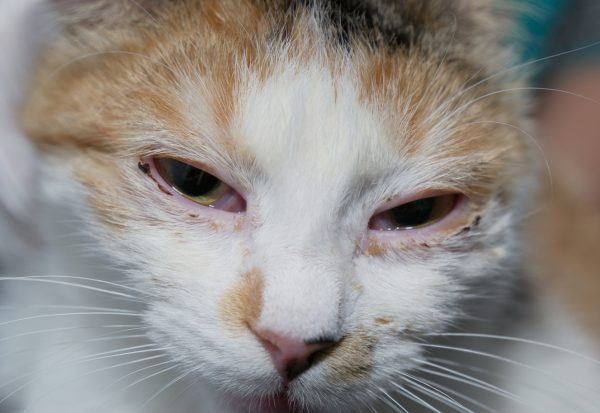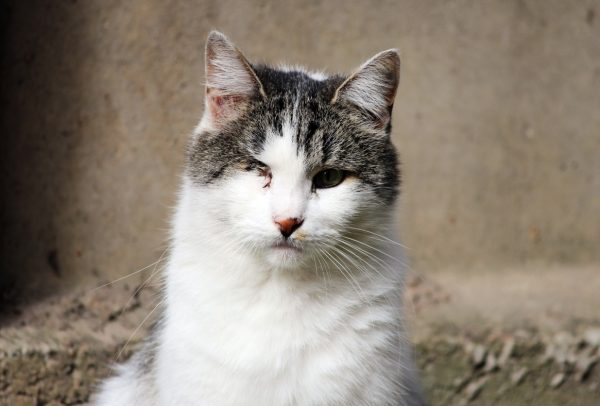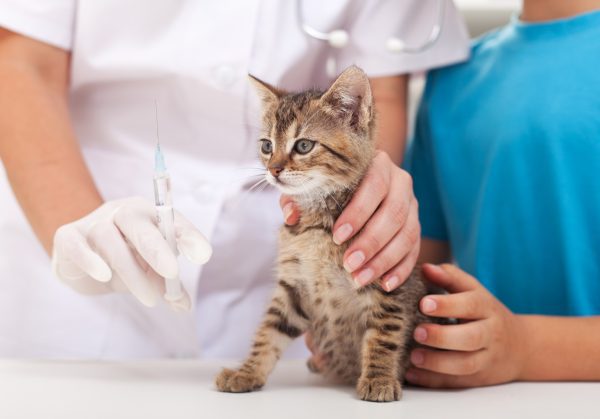What Is Cat Herpes?
Cat herpes is highly contagious and one of the major contributing factors for feline upper respiratory infections (URIs) and flu. The virus is more formally known as Feline Herpesvirus (FHV, FHV-1) or Feline Viral Rhinotracheitis (FVR). Most felines will be exposed to FHV-1 while still a kitten, either through contact with the mother or from another cat. Many cats will become dormant or latent carriers of the virus for life.
Can Cats Get Herpes?
The herpes virus in cats can be found in all parts of the world and affects both wild and domesticated animals. Although most felines will be exposed to herpes at a young age, it can affect the animal at any stage during its life and is transmissible regardless of weight and size.

Cat Herpes Symptoms
FHV has many symptoms. Most last for just two or three weeks. However, the virus will often lay dormant in the body of the cat for many years. For most felines, the FHV/FVR virus causes no issues. However, the virus may return on occasion throughout the cat’s life, particularly when the animal is stressed or ill.
Some of the indicators of feline herpes include:
- Upper respiratory infection
- Discharge around the eyes
- Pink eye
- Nasal discharge
- Irritation to the throat
- Sneezing
- Fever
- Exhaustion
- Drooling
- Coughing
- Loss of appetite
- Keratitis (an infected and inflamed eye)
- FHV-associated dermatitis (inflammation, and ulcers near the nose, mouth, and legs)
How Do Cats Get Herpes?
There are several different ways that a cat can contract FHV, including:
- Direct contact with saliva, nasal secretions, or eye discharge from an infected cat
- Through sneeze droplets from an infected cat
- By sharing litter boxes and food/water bowls
- Through contact with a kitten’s mother during the first few weeks of life
- Using shared grooming tools and bedding
FHV/FVR is extremely contagious and is often transmitted in areas where multiple cats are allowed to mix, including multi-cat households, rehoming shelters, and boarding facilities. Although all breeds of cats can pick up the virus, those with weakened immune systems will be more susceptible. In addition, flat-faced cats (such as Persians) are also at a higher risk of contracting the virus.

Can Cats Get Herpes from Humans?
The strain of the herpes virus that a cat gets is different from that of a human, or even a dog. That means that cats will not get herpes from humans and vice versa.
How Is Cat Herpes Diagnosed?
Generally, having a specific diagnosis for cat herpes is not always necessary. It is often presumed that the signs of an upper respiratory infection indicate that either feline herpesvirus or feline calicivirus (FCV) is present.
When a diagnosis is necessary, swabs will be taken from the cat’s eyes and mouth, and a veterinary laboratory will carry out a polymerase chain reaction (PCR) test to detect the genetic material of the virus. Biopsies can also be a useful diagnostic tool for identifying FHV-associated dermatitis.
Can Cat Herpes Be Cured?
There is no known cure for FHV. The goal of any treatment is to reduce the symptoms and control the severity and frequency of any recurring flare-ups.

Cat Herpes Treatment
If any of the symptoms of herpes are present in a cat, speak to a veterinarian as soon as possible. FHV infections are often complicated by a secondary bacterial infection. When this is the case, treatment for herpes virus in cats relies on antibiotics as the most frequent course of action recommended by a veterinarian.
In cases of chronic herpes in cats, hospitalization may be necessary. This will allow intravenous fluid therapy to take place, along with nutritional support, steam inhalation, and nebulization.
When an FHV infection is present, antiviral drugs may be offered as to manage the symptoms. Some cat herpes medicine include:
- Famciclovir. This is a human antiviral drug that is safe for cats. It can be given orally and is useful in severe infections.
- Idoxuridine, Cidofoxir, and Trifluridine. These are topical ocular anti-herpes drugs that can be used to treat keratitis and FHV-associated conjunctivitis in cats.
- Tobramycin and Ofloxacin. These are broad-spectrum eye drops that can be used for treating conjunctivitis brought on by herpes.
Lysine for cat herpes is an amino acid supplement that is often used to treat the clinical signs of FHV-1. However, there are studies that indicate that using lysine supplementation to treat feline herpesvirus is not effective.
To assist in the reduction of flare-ups of the herpes virus, the cat’s bedding and blankets should be washed on a regular basis. In addition, clean any food/water bowls and litter boxes daily and ensure the cat has a comfortable, clean, and stress-free environment at all times.
When symptomatic, felines will often not be able to smell their food. To help stimulate the appetite, gently heating wet food can help.

Cat Herpes Vaccinations
Getting a cat vaccinated for FHV is important. It is recommended that every kitten receives two or three injections at eight weeks of age. After a year, all cats should be given a booster. Follow-up boosters should be provided every one to three years going forward.
While receiving a vaccination will not necessarily stop the cat from becoming infected with FHV, it will help reduce the severity of the disease’s impact. Unlike with Feline Calicivirus, there are not multiple strains of the herpes virus in cats, so the existence of other mutations does not compromise the vaccine’s effectiveness.
To help prevent the contraction of the virus in the first case, keeping a cat indoors will stop them from encountering infected or unvaccinated carriers.
Can a Cat with Herpes Be Around Other Cats?
While a feline is demonstrating the clinical signs of the herpes virus, it should be kept separate from other felines while they are symptomatic. Where cats live in groups, any that show clinical signs of herpes should be isolated. Separate feeding bowls and litter boxes should be provided, and anything that is shared should be disinfected.
Cats will usually shed the virus at around three weeks, so it is important that they remain separate for this duration, even if they appear to have recovered. When the virus is latent, a cat that has herpes can be around other felines.



